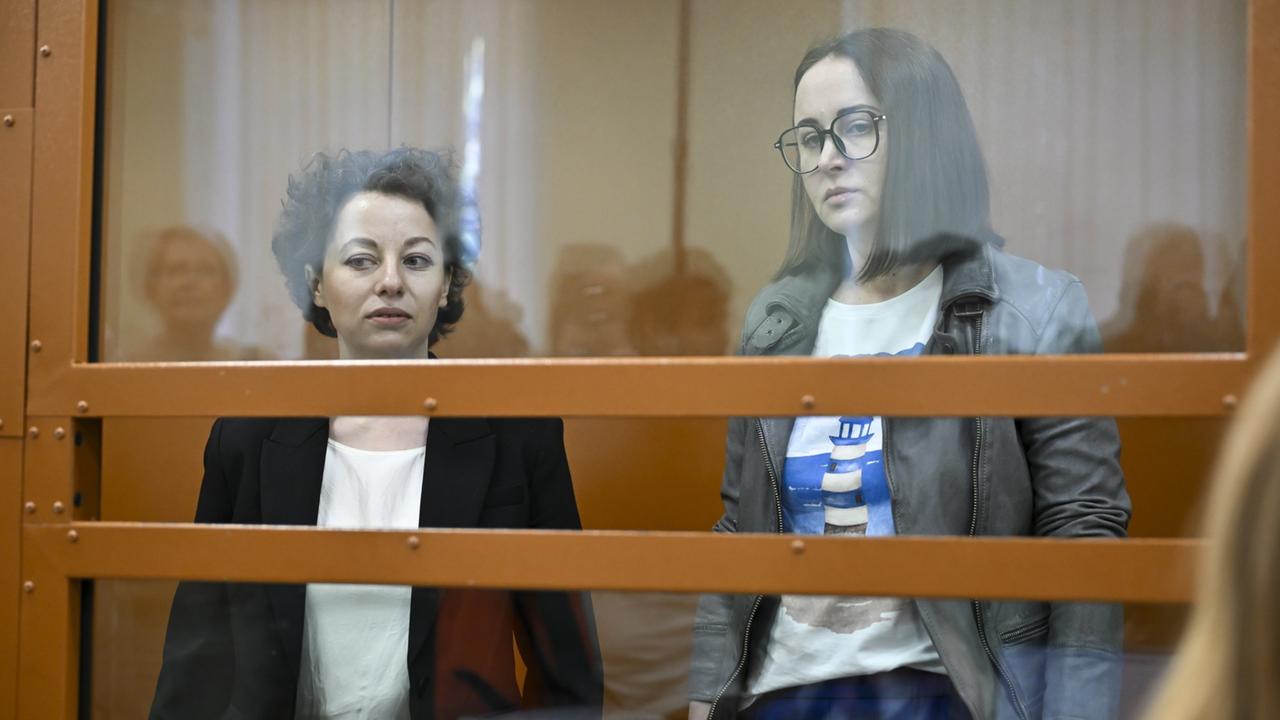In 2022, “Finist, the Bright Falcon” received Russia's most important theater award and was acclaimed. In 2024, the women who wrote the play will go on trial. A case that tells a lot about today's Russia.
It is stuffy in the hallway of the Moscow Military Court. A few dozen people are crowded together, hoping for a seat in the hearing room or at least for a brief eye contact with Yevgenia Berkowitsch and Svetlana Petrijchuk.
Before the two women are led through the corridor into the courtroom by armed masked men, a court clerk shouts at those waiting: “Not a word! Anyone who waves or makes a hand gesture will be thrown out immediately.” It is dead silent as the defendants are led into the courtroom.
On the list of “extremists”
Both have been in custody for a year and their names have been on the list of “extremists and terrorists” since April. They are accused of propagating Islamic extremism and terrorism with their play “Finist, the Bright Falcon.” But this process is probably about much more than just a play.
The play, written by Petrijtschuk and directed by Berkowitsch, is about women from Russia who fall in love with IS fighters online, get themselves recruited for the “Islamic State” and then fly to Syria. It is based on real cases and court records. And just two years ago it won the “Golden Mask”, Russia's most important theater award.
Understood everything linguistically – “but nothing in terms of content”
Now Berkowitsch and Petrijchuk are sitting in a glass cage in court, where prosecutor Yekaterina Denisova is explaining to the two that they represent and propagate a particularly aggressive form of radical Islamism. With criminal intent, they conspired to play the piece on as many stages as possible and thus posed a danger to society. The accusation is so absurd that a murmur goes through the hall. A masked hall guard has a woman removed from the hall.
When judge Jurij Massin asks the two defendants whether they understand the allegations, Berkowitsch stands up behind the bulletproof glass. She is no more than 1.60 meters tall, carefully made up, with curly hair and wearing a dark suit. “Your honor,” she says, she understood everything in terms of language, “but nothing in terms of content.”
Feminist and opponent of war
She is neither a Muslim nor a radical. She eats pork, takes photos of herself on the beach and is married to a non-religious Russian. She sees her play as a warning against terrorism, which is why she performed it, and why it won an award.
Then Petrijtschuk also comments on the accusations, and some in the room can barely suppress a giggle: “Hm,” she says. “Radical Islamists would hardly use a play for their propaganda. Don't they reject this art form as the work of the devil?”
It has long been clear that the play in question is only a means to an end – and that it is actually about the two women. Above all, about Yevgenia Berkovich, a well-known director, declared feminist and opponent of the war against Ukraine.
Hardly anyone dares to hire people who have fallen into disgrace
Behind closed doors, people talk about the “theatre trial” – just like during the Stalin era. The cultural scene, it seems, is to be “cleansed” and anti-war attitudes are to disappear from theaters and concert halls.
Many pop stars, ballerinas, directors and actresses have already left the country in protest. Some are also leaving because they can no longer perform here anyway. Hardly any stage operator dares to hire artists who have fallen out of favor.
The actresses carry on – even without their director.
“Understanding that the other Russia still exists”
Yevgenia Berkowitsch's ensemble, an all-actress troupe called “Soso's Daughters”, continues to play without her. The performances are sold out for weeks.
Last week, on a small Moscow stage, the women performed the play “Reishund”, directed by Yevgeniya and written by the exiled writer Aleksandr Swarovsky. At first glance, a non-political piece, funny but also dark and with many allusions to the absurdities of today's Russia.
The women face years in prison
“You look at the person sitting next to you and see that the laughter is also stuck in his throat – and you know that you are not alone,” says one spectator after the performance. “Theater helps you understand that the other Russia still exists.”
Some theaters continue to play the plays of ostracized directors or dramaturgs, but leave out their names in the program. “Soso's daughters” stand by Yevgeniya and Svetlana. At the end of each performance, ask the audience to write letters to the detention center. It's quite possible that the two of them need this support: Yevgenia Berkowitsch and Svetlana Petrijtschuk face years of imprisonment.





